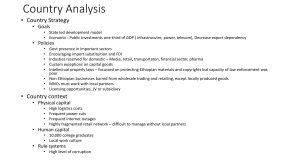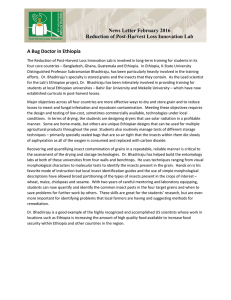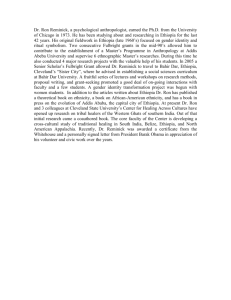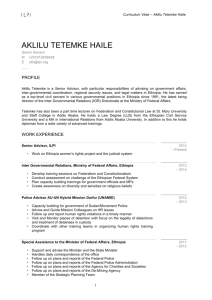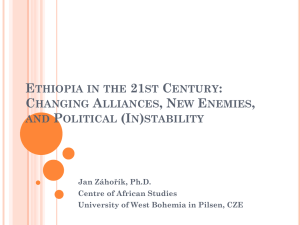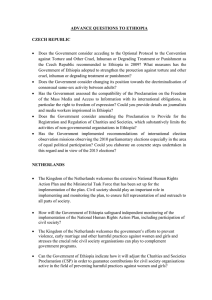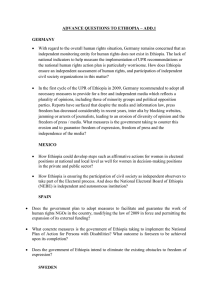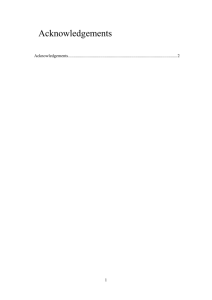Ethiopian vs. American Education: A Comparison
advertisement
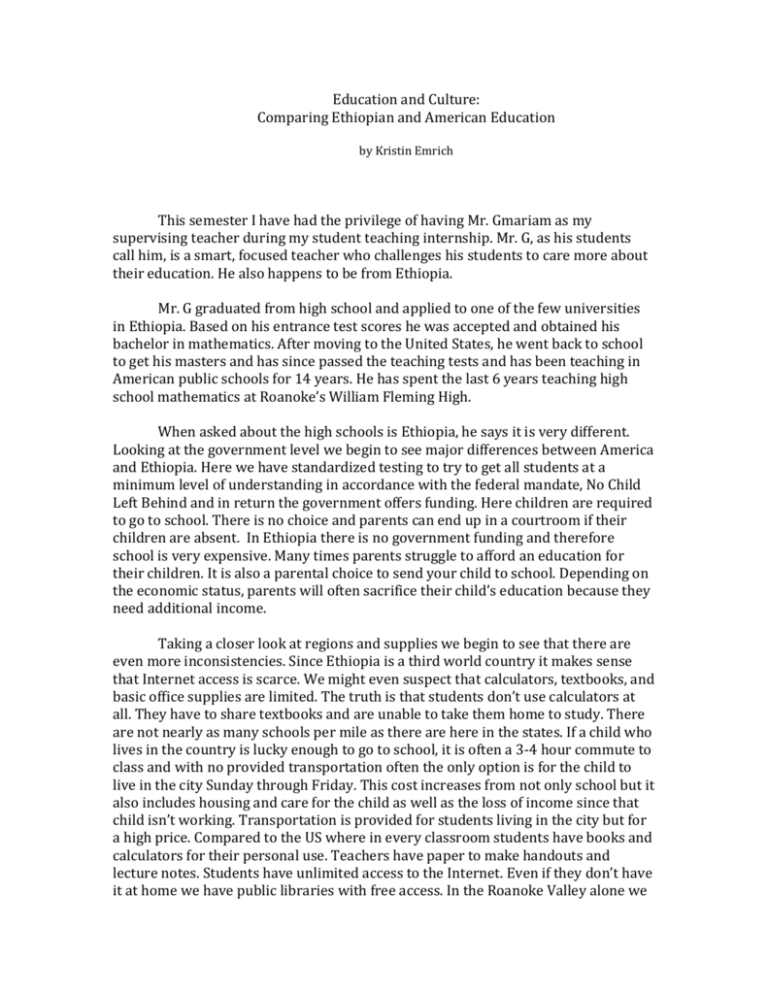
Education and Culture: Comparing Ethiopian and American Education by Kristin Emrich This semester I have had the privilege of having Mr. Gmariam as my supervising teacher during my student teaching internship. Mr. G, as his students call him, is a smart, focused teacher who challenges his students to care more about their education. He also happens to be from Ethiopia. Mr. G graduated from high school and applied to one of the few universities in Ethiopia. Based on his entrance test scores he was accepted and obtained his bachelor in mathematics. After moving to the United States, he went back to school to get his masters and has since passed the teaching tests and has been teaching in American public schools for 14 years. He has spent the last 6 years teaching high school mathematics at Roanoke’s William Fleming High. When asked about the high schools is Ethiopia, he says it is very different. Looking at the government level we begin to see major differences between America and Ethiopia. Here we have standardized testing to try to get all students at a minimum level of understanding in accordance with the federal mandate, No Child Left Behind and in return the government offers funding. Here children are required to go to school. There is no choice and parents can end up in a courtroom if their children are absent. In Ethiopia there is no government funding and therefore school is very expensive. Many times parents struggle to afford an education for their children. It is also a parental choice to send your child to school. Depending on the economic status, parents will often sacrifice their child’s education because they need additional income. Taking a closer look at regions and supplies we begin to see that there are even more inconsistencies. Since Ethiopia is a third world country it makes sense that Internet access is scarce. We might even suspect that calculators, textbooks, and basic office supplies are limited. The truth is that students don’t use calculators at all. They have to share textbooks and are unable to take them home to study. There are not nearly as many schools per mile as there are here in the states. If a child who lives in the country is lucky enough to go to school, it is often a 3-4 hour commute to class and with no provided transportation often the only option is for the child to live in the city Sunday through Friday. This cost increases from not only school but it also includes housing and care for the child as well as the loss of income since that child isn’t working. Transportation is provided for students living in the city but for a high price. Compared to the US where in every classroom students have books and calculators for their personal use. Teachers have paper to make handouts and lecture notes. Students have unlimited access to the Internet. Even if they don’t have it at home we have public libraries with free access. In the Roanoke Valley alone we have 8 high schools. There are bus services available and the cost of education is very low. From everything above, it would be very easy to think that the schools here are much better and we are lucky to have such a great education system. While that is true there are downfalls to our system and there are incredible benefits to the education that is given in Ethiopia. Consider the poor Ethiopian culture and the poor United States culture. While the NCLB Act is designed to improve out program, one side effect is that not all parents encourage their children to put in effort. Parents might prefer to have the extra income or perhaps they simply don’t see the need and that attitude is passed down to their children. On the other hand, sometimes students or parents feel that an education is a right and lose appreciation for its true value. Often students don’t care about putting in effort, working on homework or understanding the material. They simply want to pass and get out so that they can get on with life. Ethiopian students either want to be in school or have parents who forced them to go because they realize the immense impact that an education can have in a person’s life. Although calculators are an exceptional tool, they are often used in place of grasping the concepts. American students are not only allowed to use calculators on tests, they are encouraged to use them in class in place of doing work by hand and taking notes. Many students have been given an assignment and know which buttons to push on their calculator to get the right answer. However, given a piece of paper and pencil or a different style calculator they are lost. In Ethiopia students are not allowed to use a calculator in class or on tests. Although they might not have as much experience with technology, they do end up understanding important concepts and being able to problem solve. They remember material and actually learn. Perhaps the bigger issue though is that the culture in America does not respect authority. Our culture says that whatever feels good for you is what you should fight for and no one has the right to stand in your way or question your decisions. That thinking goes against parenting, discipline, and living by any set of rules. For children living in our culture, to respect authority and value wisdom is abnormal. Ethiopian culture places high esteem on parents, elders, and authority figures. What is said is expected to be followed whether it is from a parent, a neighbor, or a teacher. Regardless of our school system’s failing, we have the tools and ability to successfully teach our students and help them achieve their goals. We are blessed to have a government who cares about the future of all of our children. We have access to technological resources that not only aid our general education but hold within them job opportunities that are growing exponentially. Given the right encouragement, a little self-motivation, and someone who cares, any child in the United States of America has the opportunity to receive an education. That is an invaluable accomplishment.

